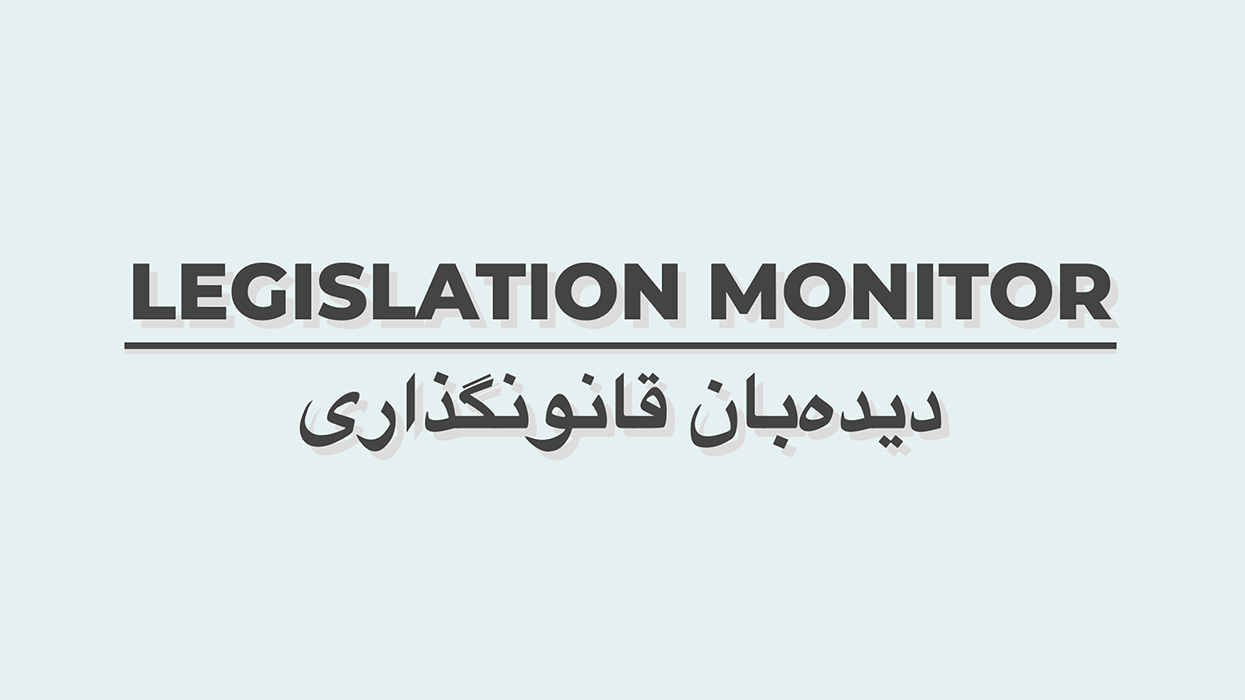| Legislation Monitor | |
| دیدهبان قانونگذاری | |
⬥
The Selection Law
| Legislative Item # | Registration Number: 469 |
| Draft Legislation Title | Selection of managers and employees of the Islamic Republic |
| عنوان پیش نویس قانون | گزینش مدیران و کارگزاران نظام جمهوری اسلامی |
| Date of Submission | May 25, 2021 |
| تاریخ تحویل | ۲۵ اردیبهشت ۱۴۰۰ |
| Cosponsors | The bill is co-sponsored by 27 members of the current parliament. |
| Supporters | TBC |
| Against | TBC |
LEGISLATIVE PROFILE
Bill Objective
The proposed bill, if adopted, will replace the Selection Law (1995) (also known as the law for the Gozinesh Process). Sponsors of the draft legislation note that they intend to build on lessons learned from over thirty years of applying the Selection law to improve the processes’ efficiency.[1] [1]
The gozinesh process makes employment in the country’s public sector conditional on discriminatory grounds –– effectively prohibiting several religious and ethnic minorities from fully participating in economic life.[2] [2] As described by the UN Special Rapporteur on the situation of human rights in the Islamic Republic of Iran: the process “involves investigations conducted by the Supreme Selection Council and the Ministry of Intelligence into the acceptability of an applicant’s beliefs, previous political opinions, and affiliations” and is intended to ensure that applicants “adhere to and have knowledge of Islam, follow the theory of Velayat-e-faqih (rule of an Islamic jurist under Shi’ite Islam) and are loyal to the Islamic Republic of Iran.” [3] [3]
Human Rights Impact
The draft bill preserves the shortcomings in the current Selection Law. The current law of “selection” generates grounds for discrimination based on thoughts, conscience, and religion or belief, including political beliefs. The gozinesh process violates the right to work under ICESCR Arts. 6 and 7 in relation to the principle of non-discrimination under ICESCR Art. 2(2). While the right to work is not ‘an absolute and unconditional right’, but individuals may not to be deprived of employment unfairly. The labor market must be accessible indiscriminately.
In its latest submission to the CERD committee, authorities asserted “the criterion for recruiting forces in government organizations and departments observes the Constitution of the Islamic Republic of Iran. Needless to say, a government official must be committed to the law that they are responsible for enforcing, as is the case everywhere with an adopted constitution.”[4] [4]
The gozinesh process infringes on the right to equality of opportunity or treatment in employment or occupation for all those who seek employment in the public sector and, reportedly in some instances, in parts of the private sector on the basis of religious affiliation, political opinion, or political affiliation. In practice, members of ethnic and religious minorities, as well as those who hold political opinions which differ from those accepted by the State, face discrimination. In addition to violating the right to equal access to work without discrimination as guaranteed under Articles 6 and 2 and 7 of the International Covenant of Economic Social and Cultural Rights (ICESCR), the gozinesh process contravenes Article 23 of Iran’s Constitution, which states that ‘”[t]he investigation of individuals’ beliefs is forbidden, and no one may be molested or taken to task simply for holding a certain belief.” The criteria also establish a barometer for measuring the degree to which an applicant is committed to promoting the views of the State. For example, among the topics relevant to the selection process are assessments of an applicant’s involvement, or lack of involvement, in revolutionary and religious institutions, charities, or of their attendance at congregational prayers or government-sponsored rallies.
Timeline
Date of receipt by Parliament: May 25, 2021
Date of issuance of expert opinion by the Research Center: October 13, 2021
Possible timeframe for bill discussion: April to July 2022
[1] [5] See https://rc.majlis.ir/fa/legal_draft/show/1659385 [6] (in Persian)
[2] [7] See http://rc.majlis.ir/fa/law/show/92541 [8] (in Persian)
[3] [9] Report of the Special Rapporteur on the situation of human rights in the Islamic Republic of Iran, 18 July 2019 [10]
[4] [11] See CERD/C/IRN/20-27 [12]
